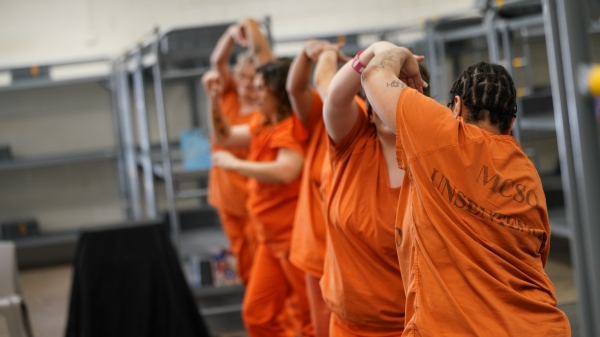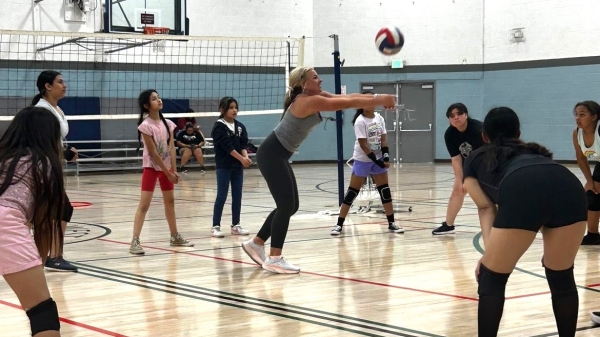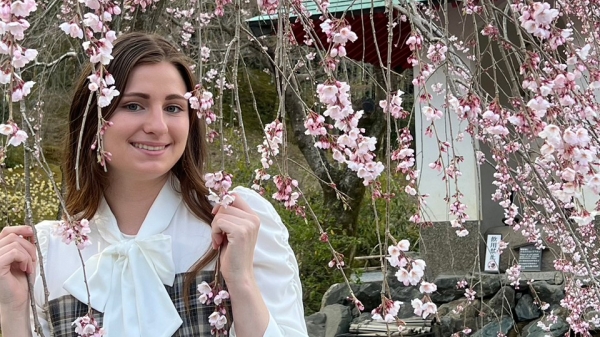Panelists discuss future of personalized learning
Goal of 'the right content, to the right student, at the right time' faces obstacles in widespread acceptance

About 4,300 people are signed up to attend the three-day ASU + GSV Summit this week. Photo by Charlie Leight/ASU Now
Editor's note: Read more of the highlights from the ASU + GSV Summit on our blog.
Monday at the ASU + GSV Summit, Leap Innovations founder Phyllis Lockett moderated a discussion about the future of personalized learning, featuring panelists Larry Berger, CEO, Amplify; Nick Gaehde, president, Lexia Lerning; Phil Regier, university dean for educational initiatives and CEO of EdPlus at Arizona State University; and Joel Rose, co-founder and CEO, New Classroom Innovation Partners.
The education-technology experts discussed the challenges that exist in developing technology-based tools and systems at scale. Primary to the discussion was the notion of personalization, and how K-12 and higher education institutions can implement technology without losing the personalization that is integral to successful learning outcomes.
According to Gaehde, “When we think about personalized learning, we think about the engineering model, which is something that is technology-driven only, but that’s often the problem with some of the personalized learning solutions that are put in place. When we talk about personalizing learning for the student, we are also talking about personalizing for the educator to make sure they have the right data about the student, at the right time, and the right instructional sequences to address strengths and weaknesses.”
The panel discussed how striking a balance between technology and in-person instruction was critical to achieving successful learning outcomes, but also to broadening acceptance of technological tools in the classroom. The objective of personalized learning tools, they agreed, is not to replace the instructor, but rather to support instructors by providing them the data needed to understand what their students know, where they are struggling, and then adapt accordingly.
“I have a very simple idea here, that personalization is the right content, to the right student, at the right time,” Regier said. “The challenge we have is how to reach more and more students with declining resources. The technology of the underlying system is absolutely critical. We can’t scale without the technology.
The panel discussed how the implementation of personalized technology in the classroom has been slow. Said Lockett, “Part of the challenge is that the development is happening so far away from the needs of our educators and our students, and then we wonder why adoption is so slow.”
Misconceptions about the role of education technology software, a lack of transparency from the industry and a lack of investment have hindered the widespread adoption of technological tools in the classroom, panelists said.
“There has been a profound lack of investment in K-12 R&D (research and development),” said Rose. “We are stuck in an ecosystem that can’t really generate the type of revenue that is required to develop a totally transformative experience.”
Personalized education technology has been around long enough that its efficacy has been demonstrated. The challenge, according to Gaehde, is that “the research is not getting into the hands of the decision makers. The decisions are happening at too high of a level. This doesn’t give access to people who actually need it.”
More Arts, humanities and education

ASU Gammage program brings the arts to incarcerated women
Laughter might not be the first thing you expect to hear when arriving at Maricopa County Estrella Jail, the all-women prison…

Maryvale girls gain confidence through volleyball program
Life as a teen or tween can be tough, particularly for girls. That's why an Arizona State University partnership with a…

ASU double major plans to use Japanese studies in her business career
Editor’s note: This story is part of a series of profiles of notable spring 2024 graduates. Racine Merritt is a business-minded…